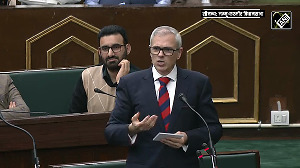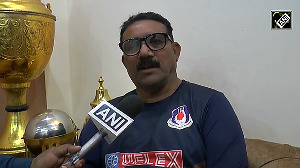Around 80 million rural households are estimated to have no access to grid power.
Off-grid decentralised systems, based on renewable energy, are lighting up around 1,000 villages through government funding.
In the second of a two-part series, Jyoti Mukul travels to remote villages in Bihar's Araria district to see how micro-grids are providing a reliable source of power to small businesses and rural households
Part 1: How solar power is lighting up 1,000 remote villages

In a veranda outside a mud house, A Rehman sits with some 10 men and an old woman.
They are eager to talk about electricity, brought to their village through a 30-Kw solar micro grid system in January.
As it's hot and humid, a few straw hand-fans are passed around. This village, like many others in the vicinity, does not know what it is like to run electric fans or have electricity during the day.
"If not for him, we wouldn't be been able to set up the unit and get power to households here. He helped us in the survey and in convincing people to use our power," says Deepak Das, assistant general manager with Decentralised Energy Systems India (DESI Power), pointing towards Rehman.
Das is a known face within this village and a few others, in which the company has set up micro grids across the Araria district.
Rehman says the village, of some 4,000 people, does not need grid power because DESI Power is reliable. Any additional power it generates can easily be absorbed.
An old man present at the gathering says, "If only it was a little cheaper, more people would buy it. We want power even during the day." Not everyone in the village is buying power from the company. In August, DESI Power made Rs 27,900 from here.
Though agriculture is the primary source of income here, at least one member in most households in this Muslim-dominated village works in either West Asia or Mumbai as a labourer or a waiter in small-time restaurants.
For DESI Power, the business in Lokhariya includes sale of water by running five pumps on solar power. For every hour of supply, DESI Power charges Rs 100.
In this village alone, the company provides electricity to 204 houses and a masjid, for four hours in the evening. Seven street lights are powered for free.
What made DESI Power click in this village and a number of others in the district is the 'Bulluji' factor. Bulluji, S N Sharan to others, is the managing director of DESI Power. He hails from Mahalgaon and operates out of his house in Arariya's Chitraguptanagar colony.
Sharan says he was inspired by his brother H N Sharan, a power sector veteran. In 1996, H N Sharan and Ashok Khosla, founder of the New Delhi-based Development Alternatives, founded DESI Power. The company now has about 40 employees, including five engineers.
"There is one thing common to all of them. They are local boys who did engineering but decided to work for villages through our organisation," says S N Sharan. "Since I am a local person, people know me and it becomes easier for us to work."
In Mahalgaon, Sharan has employed Bhalo Devi, who runs a biomass plant, switches on the power supply from solar panels and operates machines and gassifiers.
Though Bhalo Devi isn't educated, she is clear about her role and could well give tips on green energy to others. For DESI Power, she operates six water pumps that run on biomass and irrigate 150 acres.
Sharan says he has never faced resistance from diesel genset operators in the villages where DESI Power came up with solar powered solutions.
The biggest challenge is from mobile tower operators who try to sell power on the sly from such gensets, at cheaper rates. Such operators and similar commercial establishments are potential customers the firm is eying.










 © 2025
© 2025